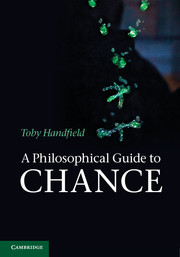Book contents
- Frontmatter
- Contents
- Preface
- 1 The concept of chance
- 2 The classical picture: What is the world made of?
- 3 Ways the world might be
- 4 Possibilities of thought
- 5 Chance in phase space
- 6 Possibilist theories of chance
- 7 Actualist theories of chance
- 8 Anti-realist theories of chance
- 9 Chance in quantum physics
- 10 Chance in branching worlds
- 11 Time and evidence
- 12 Debunking chance
- References
- Index
12 - Debunking chance
Published online by Cambridge University Press: 05 June 2012
- Frontmatter
- Contents
- Preface
- 1 The concept of chance
- 2 The classical picture: What is the world made of?
- 3 Ways the world might be
- 4 Possibilities of thought
- 5 Chance in phase space
- 6 Possibilist theories of chance
- 7 Actualist theories of chance
- 8 Anti-realist theories of chance
- 9 Chance in quantum physics
- 10 Chance in branching worlds
- 11 Time and evidence
- 12 Debunking chance
- References
- Index
Summary
Chance, when strictly examined, is a mere negative word, and means not any real power which has anywhere a being in nature.
(Hume 1902 [1777])Darwin's theory of evolution is an unsettling idea. It provides explanations for the existence of many features of the biological world. Not least, it provides explanations for the existence of human traits and behaviours which we typically take for granted. These sorts of explanations can threaten our ordinary self-understanding.
Normative concepts, like rationality, reason, right, and wrong do not play any essential role in the explanations offered to us by evolutionary theory. Moreover, it appears as though the very existence of our concepts of rationality, reason, right, and wrong might be susceptible to being explained – in large part – by evolutionary theory. The question then arises: are the explanations of these concepts that we can obtain from evolutionary theory capable of vindicating our ordinary practice in deploying those concepts? Having understood evolutionary theory, should we be content to employ normative concepts in much the same way that we did before? Or does an evolutionary account debunk the normative realm? Does it show that, implicit in our normative practices, there is something misguided, erroneous, or otherwise incorrect?
- Type
- Chapter
- Information
- A Philosophical Guide to ChancePhysical Probability, pp. 218 - 245Publisher: Cambridge University PressPrint publication year: 2012



